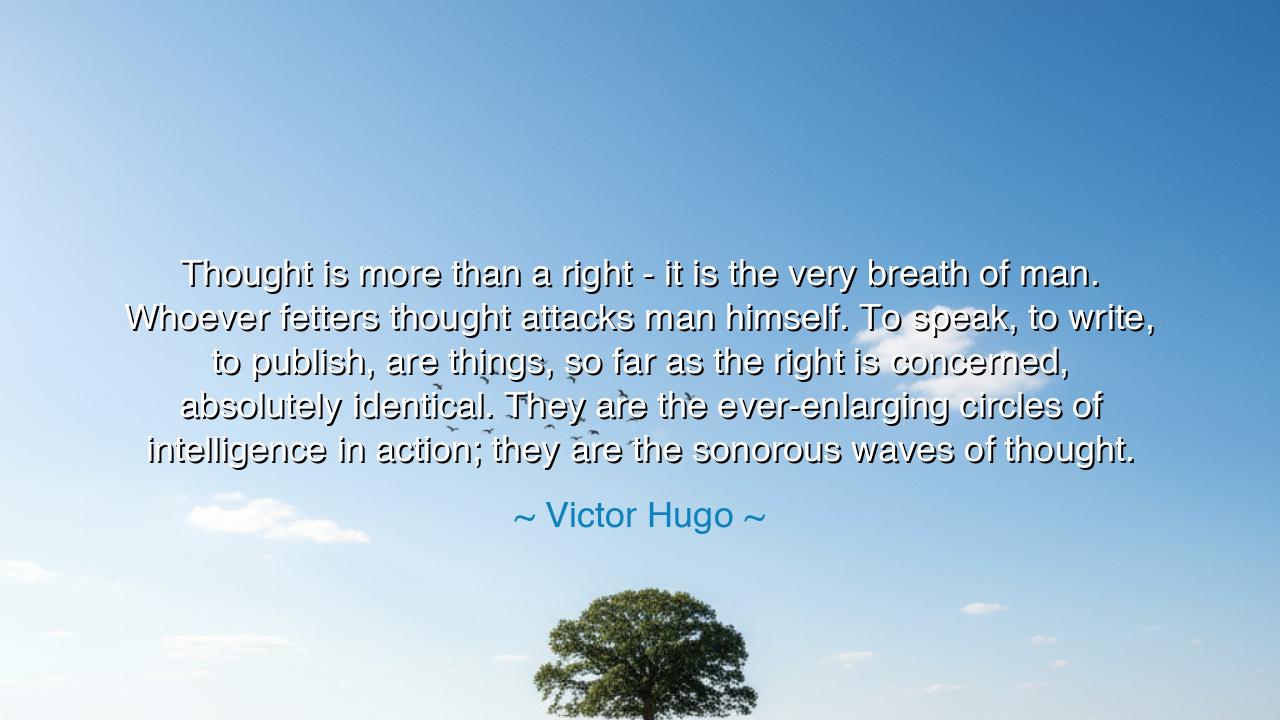
Thought is more than a right - it is the very breath of man.
Thought is more than a right - it is the very breath of man. Whoever fetters thought attacks man himself. To speak, to write, to publish, are things, so far as the right is concerned, absolutely identical. They are the ever-enlarging circles of intelligence in action; they are the sonorous waves of thought.






The Sacred Breath of Thought
Among the voices of the ages, few have spoken with such thunder and tenderness as Victor Hugo, poet, prophet, and defender of the human spirit. In the midst of tyranny and censorship, he declared: “Thought is more than a right—it is the very breath of man. Whoever fetters thought attacks man himself. To speak, to write, to publish, are things, so far as the right is concerned, absolutely identical. They are the ever-enlarging circles of intelligence in action; they are the sonorous waves of thought.” These words rise like a hymn to freedom itself, a reminder that to think is to live, and that to silence thought is to suffocate the soul of humanity.
Hugo spoke these words in the nineteenth century, a time when Europe trembled between revolution and repression. France, his beloved homeland, had endured the fall of monarchs, the rise of emperors, and the blood of barricades. In such times, power sought to muzzle the pen, to cage the mind, to command not only bodies but beliefs. But Hugo, who had seen kings fall and exiles return, understood that no power could bind the wind of intelligence, nor chain the tide of thought. His declaration was more than a defense of speech—it was a defense of existence itself. For to think, he said, is not a privilege bestowed by rulers; it is the very essence of being human.
In calling thought “the very breath of man,” Hugo invoked a sacred image known since the dawn of creation. The ancients spoke of the divine breath that gave life to dust, the spark that animated flesh and turned silence into song. Thought, then, is not merely an act of the brain—it is the breath of the soul, the invisible current that moves civilizations forward. When one man speaks a new idea, it spreads outward like ripples upon water, touching distant shores. To speak, to write, to publish—these are not separate deeds, but expressions of one divine act: the unfolding of consciousness into the world.
Consider the story of Galileo Galilei, the astronomer who dared to let thought breathe where dogma suffocated. When he looked through his telescope and saw the heavens moving, he spoke what he saw, and for that truth he was condemned. They sought to fetter thought, to force him to recant, to make him doubt the very breath that filled his mind. Yet even as he whispered “E pur si muove”—“And yet it moves”—his thought lived on, carried through the centuries like an eternal wind. The body can be imprisoned, the voice silenced, but thought, once born, cannot die.
Hugo’s image of the “sonorous waves of thought” reminds us that ideas are not static—they are living forces. They travel, resonate, and expand, awakening minds long after their creator has turned to dust. A single sentence, spoken in courage, can become a revolution; a poem, written in exile, can outlast an empire. Hugo himself knew this well: his words, once forbidden by despots, became the anthem of liberty. His pen was his sword, his thought a beacon that pierced through centuries of darkness.
And yet, his warning remains urgent even in our age. Whoever seeks to fetter thought, whether by censorship, fear, or apathy, commits an assault upon humanity itself. When the freedom to speak and to think is curtailed, the world grows smaller, narrower, more afraid. The air becomes thin, and the spirit begins to choke. True civilization depends not on wealth or armies, but on the free exchange of ideas—the ceaseless dialogue of minds seeking truth. To defend that freedom, then, is not a luxury—it is a sacred duty.
So let this be the lesson: Guard your thoughts, and guard the right of others to think. Speak truth, even when the world trembles. Write what your conscience demands, for silence is the ally of oppression. Do not fear disagreement—it is the proof that thought still breathes. And when you encounter those who would bind words or punish questions, remember Hugo’s wisdom: they are not defending order; they are attacking life itself.
For thought is not the privilege of the few—it is the inheritance of all. It is the breath that joins us, the invisible thread that binds past to future, man to man, and the finite to the infinite. To live without it is to exist in shadow; to speak it boldly is to bring light. Therefore, breathe deeply of this sacred air. Think freely. Speak bravely. For every act of honest thought sends forth another wave across the ocean of time—and in those waves, civilization itself endures.






AAdministratorAdministrator
Welcome, honored guests. Please leave a comment, we will respond soon